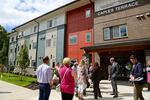
Vancouver city leaders in 2019 celebrated the grand opening of Caples Terrace, a public housing project offering affordable units to young adults who have aged out of foster care or fallen into homelessness.
Molly Solomon / OPB
With two weeks left before voters in Vancouver decide the fate of a proposed 10-year, $100 million affordable housing levy, its backers are feeling optimistic.
The city, as much of the Northwest, has grown so much in recent years that its housing stock has not kept pace. The levy’s backers say people in the community are viewing the proposal as a necessity.
“We believe in the voters,” said Katie Archer Jolma, who is leading the Bring Vancouver Home campaign that supports the housing levy. “We just believe our neighbors want to do the right thing, and that’s give everybody a roof over their heads.”
Voters will fill out their ballots Feb. 14. The levy — called Proposition 3 — would tax about 30 cents per $1,000 of assessed property value starting in 2024. That’s equal to about $135 a year for a $450,000 home.
The levy would basically be a bigger-budget sequel. Voters already passed a similar levy in 2016, but it ends this year. Through it, Vancouver has raised $42 million for affordable housing projects.
According to city data, Vancouver has spent about $35.8 million so far helping build 1,061 affordable units and 450 shelter beds. Among its projects are apartment buildings that cater to senior citizens, as well as unhoused people and their families.
Archer Jolma believes that demonstrates a proven track record for the city.
“It’s hard to say that this hasn’t been a positive for the community. That’s why we’re so optimistic about this,” she said.
As a campaign, at least, there seems to be more support for this version of the levy than its predecessor. Bring Vancouver Home is a political action committee that has raised $136,935 already. That outpaces the $108,734 the campaign raised in 2016. The PAC hasn’t faced any organized opposition in either case.
Its main target is to help people who are struggling to stay housed, or who are already without a house. The latest data in Clark County recorded about 1,197 unhoused residents — a 30% increase from 2020. And vacancy rates for apartments have hovered around 2% for at least six years, Archer said.
“We literally do not have enough housing stock,” she said.
The campaign is touting some new support this time around, too. The regional homebuilders association and a major nonprofit, which both stayed publicly on the sidelines in 2016, support the new levy.
Noelle Lovern, of the Building Industries Association of Clark County, said the organization is watching the levy closely. The county, broadly, is building about 1,600 housing units a year when it should be building about 2,500, Lovern said.
“Housing affordability in general is one of our top priorities,” she said. She noted that costs related to home building are felt by both would-be homebuyers and renters.
The new levy, like the existing one, would also allow help pay for some rental assistance and property rehabs, Archer Jolma said. A person who can’t afford a leaky roof may be eligible to tap into the fund.
The Community Foundation of Southwest Washington, a nonprofit that helps fund an array of projects in the region, is also publicly supporting the levy. President Matt Morton said housing affordability is such an issue that more communities should consider following Vancouver’s lead.
“We can’t philanthropy our way out of this crisis. We need to pull multiple levers. And one that’s really robust is public investment,” Morton said.
To him, affordability will suffer if the levy fails.
“How would we keep up with a growing crisis?” Morton said. “That’s the real risk.”
Clark County election officials are expecting about a 34% voter turnout for the Feb. 14 election. Ballots are expected to start arriving to voters by Thursday.